As the final stage of the plastics treaty negotiations draws to a close, two leading environmental advocacy groups, the International Pollutants Elimination Network (IPEN) and the Sustainable Research and Action for Environmental Development (SRADEV) Nigeria, have called for the agreement to make human health a central priority.
In a statement made available to the News Agency of Nigeria (NAN) on Monday in Lagos, the executive director of SRadev Nigeria, Dr. Leslie Adogame, urged international negotiators to ensure the treaty goes beyond just plastic waste management. The groups insisted that a comprehensive and effective treaty must address the serious health threats posed by toxic plastic chemicals across the entire lifecycle of plastic production and disposal.
With the negotiations scheduled to conclude on August 14, the statement serves as a final plea for the international community to adopt a legally binding instrument that protects human health and the environment from plastic pollution.
According to the statement, momentum is growing for global controls on harmful chemicals, with more than 80 countries – including most of the African Group of Negotiators—backing a Switzerland-Mexico proposal for robust health protections.
It noted the proposal called for a legally-binding mechanism to identify hazardous plastic chemicals, ensure transparency and traceability, and create global obligations to reduce risks in line with models used successfully in the Stockholm and Basel Conventions.
It noted that in spite of progress made, talks had been hampered by oil-producing countries using consensus rules to block stronger measures.
It added that IPEN and its Nigerian member organisation, SRADeV Nigeria, were urging procedural reforms to allow voting when consensus would fail.
“The negotiation process is currently broken. We are in damage-control mode due to the refusal to vote when consensus is blocked.
“This continues to place the Treaty’s ambition in jeopardy,” it said.
The statement quoted IPEN as stressing that the treaty must address plastics across their full life cycle – from production to disposal – and not be limited to products alone.
“As plastic production is projected to triple in coming decades, limiting production and controlling toxic chemicals is the only way to end plastic pollution and protect health,” the statement quoted Yuyun Ismawati, IPEN Co-Chair, as saying.
It added that the network also voiced concerns over exclusion of scientists, indigenes, labour representatives and other stakeholders from key negotiations due to closed-door sessions and limited access.
“We bring the voices of those most harmed by plastics.
“Negotiators must deliver a treaty that protects human health and the environment for all,” it quoted Pamela Miller, IPEN Co-Chair, as saying.
NAN reports that IPEN is a global network of public interest non-governmental organisations working to eliminate toxic pollutants and promote a toxics-free future.
SRADev is an IPEN-participating organisation in Nigeria.



